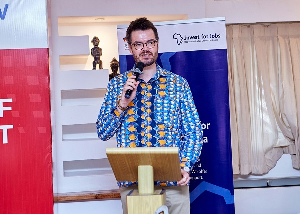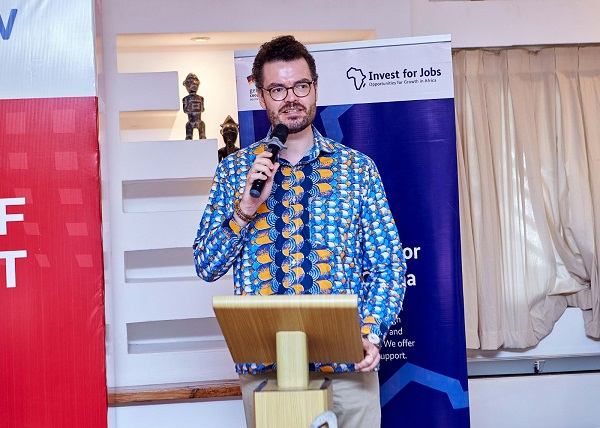 Simon Hochstein, Component Head for Invest for Jobs at GIZ Ghana
Simon Hochstein, Component Head for Invest for Jobs at GIZ Ghana
The German Development Cooperation has announced the successful completion of the “Training the Next Generation of Experts in Garment Manufacturing” (TRAINEx) program, a major capacity-building initiative aimed at strengthening technical expertise within Ghana’s textile and apparel sector.
The program was supported by the Special Initiative Decent Work for a Just Transition under the Invest for Jobs brand. It was funded by the German Federal Ministry for Economic Cooperation and Development (BMZ) and implemented by the Deutsche Gesellschaft für Internationale Zusammenarbeit (GIZ) GmbH in partnership with Brandix Corporate Campus.
Africa’s textile and garment industry continues to face a major production deficit. The continent’s value-added output is expected to reach only US$1.84 billion in 2025.
In Ghana alone, domestic demand is estimated at 120 million yards of fabric, worth roughly US$400 million, yet local factories operate at just 30 percent capacity. Limited investment and a shortage of skilled professionals have long hindered growth.
TRAINEx was developed to help close this gap by equipping young professionals with the skills needed to boost productivity and competitiveness across the sector. Participants received intensive training in production management, quality control, merchandising and costing, industrial engineering, and social compliance.
The program combined classroom learning with factory-based coaching and hands-on internships delivered by seasoned industry experts.
As part of the initiative, trainees also embarked on a study tour in Sri Lanka through a partnership with Brandix Corporate Campus, the education and training arm of the Brandix Group, one of Sri Lanka’s leading apparel manufacturers.
The international exposure allowed participants to observe global best practices and gain first-hand experience in advanced garment production processes.
With the program now completed, many participants are being absorbed into local garment factories, marking a significant step toward building a sustainable talent pipeline for Ghana’s fast-growing apparel industry.
Stakeholders say the new pool of skilled professionals will help reduce reliance on expatriate expertise and drive long-term sectoral transformation. The initiative is also expected to support future efforts to align Ghana’s textile and fashion curricula with the industry’s technical needs.
“The training enables participants to enhance their work efficiency while also equipping them to train others in the workplace,” Simon Hochstein, Component Head for Invest for Jobs at GIZ Ghana said.
“This will help improve productivity, strengthen the textile industry, and create more jobs. Such efforts make an important contribution to a Just Transition, one in which our country becomes more inclusive and creates greater opportunities for women and youth.” Hochstein added.
